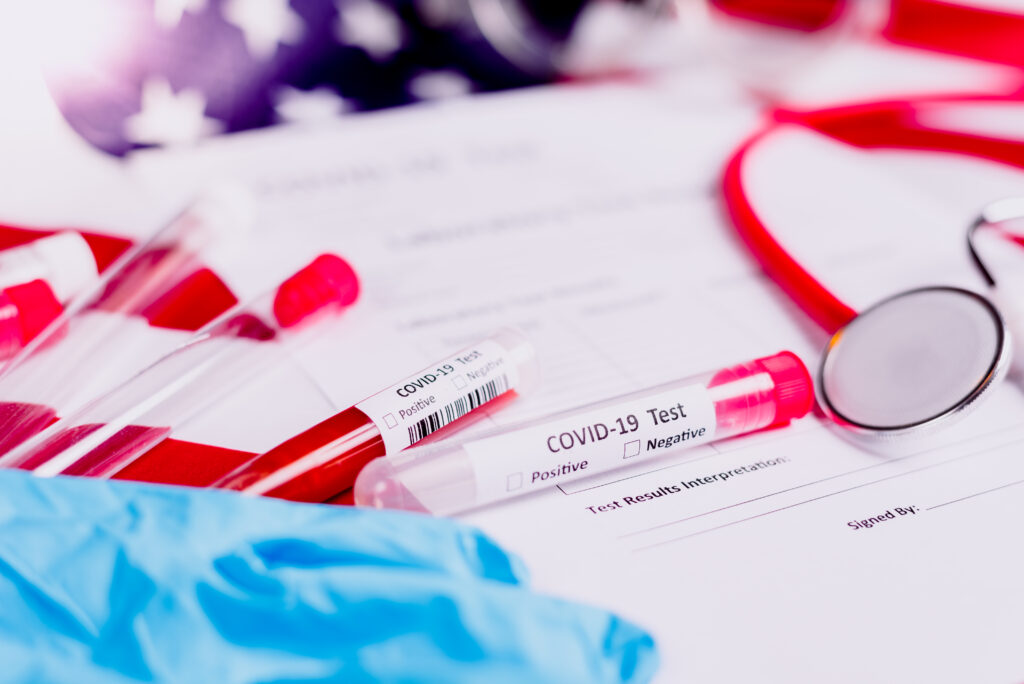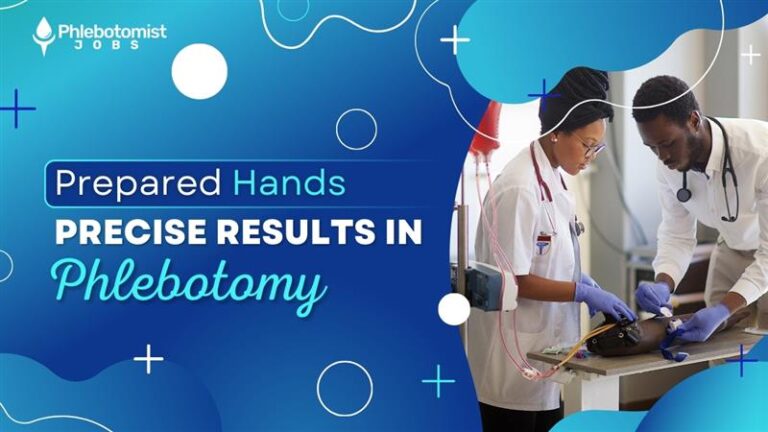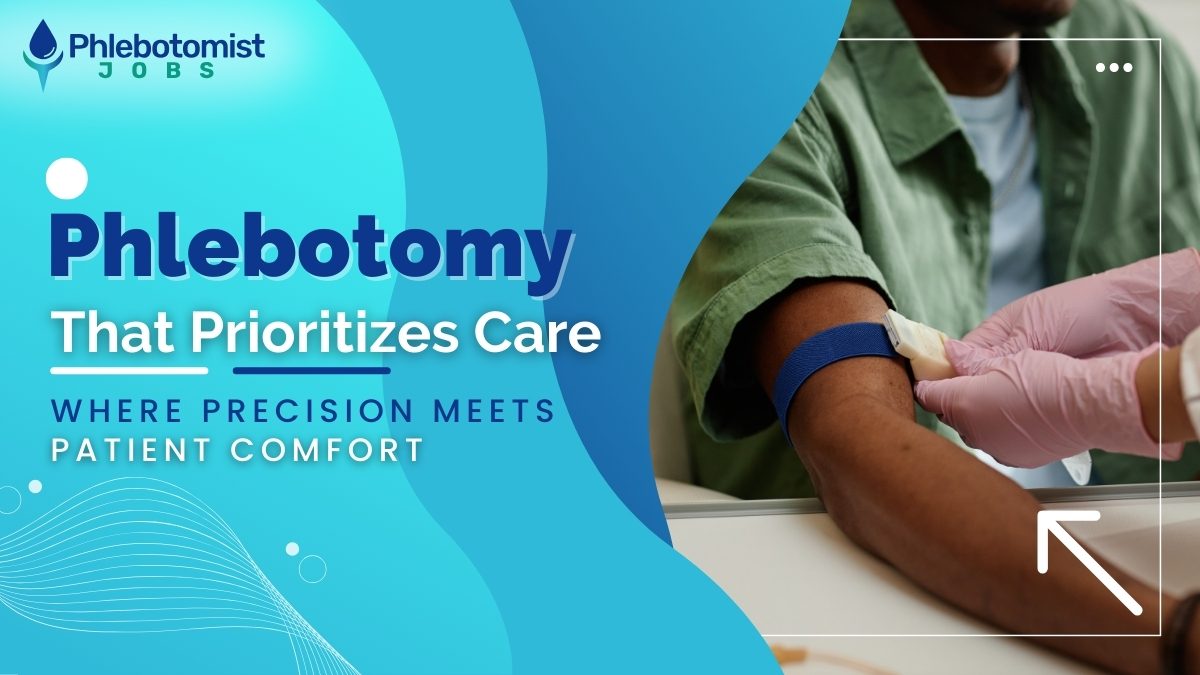Table of contents ▸
Phlebotomy is a rewarding career for those passionate about healthcare and patient care. Phlebotomy Jobs require special skills to collect blood samples safely and correctly, which is an important area in the medical field. One question that is always asked `by those pursuing Phlebotomy Jobs is whether the certification for phlebotomy is standardized across the United States. The answer is no, because requirements vary greatly. So, let us look into the ins and outs of phlebotomy certification by state, regulations, and advice for Professional Phlebotomists who are seeking Phlebotomy Jobs.
Understanding Phlebotomy Certification
Phlebotomy certification is evidence that a Professional Phlebotomist is competent in venipuncture, specimen handling, and ensuring patient safety. The certification is usually obtained after the person completes an accredited training program at a vocational school, community college, or other relevant training institute, such as Phlebotomy Training Specialists. These training programs include important topics such as human anatomy, blood collection, infection control, and patient handling, providing adequate preparation for phlebotomist job assignments in hospitals, clinics, and diagnostic labs.
Phlebotomy certification ranks as an enhancement toward getting employed and a testament of skill; yet, certification is not mandatory in many states for these jobs, which thus creates a complicated platform for study and practice under phlebotomy. Let us look at state requirements in a more detailed fashion and spot their ramifications for Professional Phlebotomists.
States in Which Certification Is Mandatory

A few states hold strict educational and professional standards, insisting on phlebotomy certification by the state to practice lawfully. These States emphasize training focused on patient safety and quality care:
- California: California merely has very stringent phlebotomist job requirements. It is necessary to obtain a license issued by the Department of Public Health, which requires an accredited program, venipuncture experience, and a certification examination on national standards from any of the agencies, such as the National Healthcareer Association (NHA) or American Society for Clinical Pathology (ASCP). Phlebotomists are classified into different levels: Limited Phlebotomist, Certified Phlebotomy Technician I, and II, with varying levels of responsibilities.
- Louisiana: Phlebotomy job opportunities in Louisiana require certification from an approved agency. Further, Louisiana imposes continuing education requirements for license maintenance, so that phlebotomists in the state may remain current in requirements and best practices.
- Washington: Washington requires the phlebotomist to be certified by the state and licensed through the Department of Health. Applicants must complete an accredited program and pass a certification exam, a procedure somewhat parallel to that of California.
In these states, importance is given to formal credentials for Phlebotomy Jobs, requiring certification for Phlebotomy Opportunities therein.
States With Optional Certification
Whereas the majority of states do not, according to the law, require phlebotomy certification to practice-though employers in these states, however, may prefer or require certification to guarantee that applicants meet the industry standards for Phlebotomy Jobs. Some examples include:
- Texas: Texas does not mandate phlebotomy certification by the state, but most employers, including hospitals and diagnostic labs, give precedence to certified Professional Phlebotomists for Phlebotomy Jobs. Obtaining certification from bodies such as the NHA or ASCP would enhance one’s ability to get opportunities in phlebotomy in this highly competitive market.
- Florida: Phlebotomy certification by the state is optional in Florida. However, certified Professional Phlebotomists enjoy greater respect from employers. If one undergoes training and becomes certified, surely better Phlebotomy Jobs may ensue: those of Miami, Orlando, etc., where healthcare activity is quite busy.
- New York: New York does not require state-mandated certification in phlebotomy, yet credentials increase the credibility and employability for phlebotomy positions. The recruitment market favors the credentialed in some industries, especially in New York City, where recognized agencies are well regarded.
In these states, phlebotomy certification is not required, but it offers a great advantage for Professional Phlebotomists struggling for Phlebotomist Jobs in a competitive job market.
Key Factors Influencing Certification Requirements

Several factors come into play that determine the discrepancy in phlebotomy certification requirements from court to court or state to state: state regulations, professional organizations, and marketing demand for Phlebotomist Jobs.
State Healthcare Regulations
Every state has its department of health, which formulates its own pre-recorded standards for healthcare professions, Phlebotomy Jobs included. For example, states like California, Washington may enforce a strict requirement, both in licensing and certification, ostensibly to keep patient safety above all else. On the other hand, a state like Texas or Florida has more options, leaving mostly standards for Phlebotomy Opportunities up to the employer’s preferences.
Role of Professional Organizations
National organizations such as the NHA, ASCP, and American Medical Technologists (AMT) provide a necessary balance in the standardization of phlebotomy certification by state. These certifications are widely accepted, even in states where certification is optional, making them particularly desirable for Professional Phlebotomists seeking Phlebotomy Jobs in different parts of the nation.
Increasing Demand for Phlebotomists
Phlebotomy Jobs compete with demand for stronger certification requirements. In states such as California and Texas, where a surprising demand is present in phlebotomists, many employers will give preference to certified candidates to guarantee an edge with quality care.
Navigating How the State Has Its Own Set of Requirements
The aspiring candidates applying for Phlebotomy Jobs should take careful note of the certification requirements by state for phlebotomy. Some steps have been outlined here that will guide you toward meeting all requirements and land you a far better job:
Research State-Specific Rules
Once you’ve decided where you want to work, research the requirements for phlebotomy certification by state in your target area before enrolling in a training program. Websites such as Phlebotomist Jobs dedicate themselves to providing you with resources and job listings useful in your journey.
Enroll in an Accredited Training Program
Choose an accredited phlebotomy program from providers such as Phlebotomy Training Specialists, where you will be able to acquire phlebotomy skills for job-related opportunities.
Opt for National Certification
Phlebotomy certification by state is optional in some states. However, obtaining a national certification through the NHA, ASCP, or AMT adds value to your resume and has the potential to bring you Phlebotomy Jobs across the country.
Keep Up with Continuing Education
Several states enforce a continuing education program in order to keep the certification valid. Stay abreast with the requirements so that your credentials will not expire and can provide you with Phlebotomy Opportunities.
Conclusion: Navigating Phlebotomy Certification by State
Phlebotomy certification varies state-wise. Depending on the state, a phlebotomist may or may not require certification to be hired. States such as California, Louisiana, and Washington require certification, while those like Texas and Florida appear to have a certain measure of flexibility. Yet, the value of a certificate from a recognized agency such as NHA or ASCP cannot be overstated in getting a job and having access to numerous Phlebotomy Opportunities. Study the respective state regulations, enroll in training from a board-accredited institution, stay abreast of continuing education requirements, and you will have a vast foundation to build your career in phlebotomy. Take your first step today toward entering the growing field of Professional Phlebotomists.
Follow us on Social Media: LinkedIn | Facebook | Twitter | Instagram












